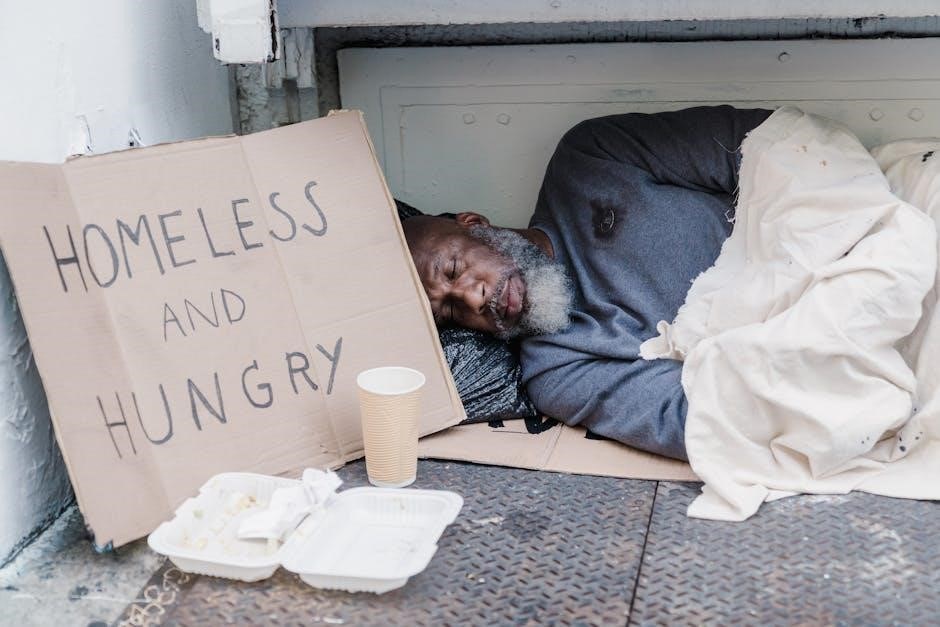Dr. Gabor Maté’s In the Realm of the Hungry Ghosts offers a compassionate exploration of addiction, blending personal stories with scientific research to reveal its deeper causes.

Overview of the Book and Its Significance
In the Realm of the Hungry Ghosts is a groundbreaking work by Dr. Gabor Maté that reframes addiction as a complex interplay of biology, psychology, and sociology. By weaving together compelling personal stories, cutting-edge research, and compassionate insights, Maté challenges traditional views of addiction, emphasizing its roots in trauma and systemic issues. The book is significant for its holistic approach, offering a deeper understanding of addiction’s causes and its societal impact. It has become a vital resource for both professionals and the general public, reshaping conversations around addiction treatment and recovery.

Understanding Addiction Through Personal Stories
Dr. Gabor Maté shares powerful real-life accounts, like Sharon’s tragic struggle with drug addiction, to illustrate the emotional and psychological complexities of addiction, making it deeply relatable.
Case Studies and Real-Life Examples from the Book
In the Realm of the Hungry Ghosts is renowned for its vivid personal narratives, such as Sharon’s heart-wrenching story of addiction and deterioration. Her tale, shared at her funeral by a priest, highlights the stark contrast between her vibrant spirit and the devastating toll of drug use. The book also features other compelling examples, including individuals trapped in cycles of heroin, cocaine, and methamphetamine addiction. These stories, rooted in Dr. Maté’s clinical experiences, provide intimate glimpses into the lives of addicts, revealing their emotional struggles and the societal factors that fuel their descent. Through these accounts, the book humanizes addiction, offering a profound understanding of its complexities and root causes.

The Concept of “Hungry Ghosts” in Addiction
The “hungry ghosts” metaphor, inspired by Buddhist mythology, symbolizes beings trapped by insatiable desires and emotional pain, mirroring the relentless struggle of addiction in In the Realm of the Hungry Ghosts.
Exploring the Metaphor and Its Psychological Implications
The concept of “hungry ghosts” originates from Buddhist mythology, describing beings consumed by endless craving and suffering. Dr. Maté uses this metaphor to illustrate the psychological torment of addiction, where individuals are trapped in a cycle of insatiable desires and emotional pain. The metaphor highlights how addiction stems from unmet needs, childhood trauma, and disconnection, rather than moral failure. By exploring this imagery, Maté offers a deeper understanding of the internal struggles of addicts, emphasizing the interplay between trauma, brain chemistry, and the relentless pursuit of relief. This perspective challenges stigma and fosters compassion for those trapped in addiction’s grip.

The Continuum of Addiction
Addiction exists on a spectrum, from street-level drug use to high-functioning behaviors like workaholism, all driven by similar underlying emotional pain and unmet needs.
From Street-Level Drug Use to High-Functioning Addicts
Addiction exists on a continuum, from visible street-level drug use to hidden, high-functioning behaviors like compulsive work or consumerism. Both extremes reflect deep emotional pain and unmet needs. Dr. Maté illustrates this through vivid case studies, showing how addiction manifests differently across socioeconomic lines. While street addicts struggle with visible deterioration, high-functioning individuals may hide their compulsions behind success. Yet, both groups share a common thread: a desperate attempt to escape inner suffering. This spectrum challenges societal stereotypes, revealing addiction as a universal human struggle rather than a moral failing.

Root Causes of Addiction
Childhood trauma and stress are key root causes of addiction, shaping vulnerability and emotional dysregulation, as explored in Dr. Gabor Maté’s work.
The Role of Childhood Trauma and Social Factors
Dr. Gabor Maté emphasizes that childhood trauma and social factors are central to understanding addiction. Adverse childhood experiences, such as neglect or abuse, profoundly shape vulnerability to addiction by disrupting emotional regulation and self-soothing mechanisms. Social determinants like poverty, lack of support systems, and systemic neglect further exacerbate this risk. The interplay of these factors creates a cycle of pain and coping that often manifests as addiction. By addressing these root causes, Maté argues, society can better support recovery and prevention, highlighting the need for compassionate, trauma-informed approaches to healing.

The Science Behind Addiction
Dr. Maté explores addiction’s biological roots, linking it to brain chemistry, dopamine systems, and stress responses. He highlights how trauma alters neurobiology, driving compulsive behaviors and dependence, offering a scientific lens to understand addiction’s complexities.
Research and Studies Highlighted in the Book
Dr. Maté draws on extensive research to explain the biological and psychological mechanisms of addiction. He delves into studies on dopamine systems, stress responses, and brain chemistry, showing how these factors drive compulsive behaviors. The book also examines the role of childhood trauma in altering brain development, particularly in regions related to emotional regulation and impulse control. Additionally, Maté discusses the impact of social environments, such as poverty and isolation, on addiction vulnerability. His work synthesizes cutting-edge science with real-life examples, offering a comprehensive understanding of addiction’s complexities.

Breaking the Cycle: Treatment and Recovery
Dr. Maté emphasizes the importance of self-understanding and compassion in healing. His holistic approach integrates psychology, neuroscience, and spirituality, offering practical steps toward lasting recovery and wellness.
Dr. Gabor Maté’s Approach to Healing and Wellness
Dr. Gabor Maté’s approach to healing and wellness is rooted in compassion and a deep understanding of addiction’s complexities. He advocates for a holistic method that addresses the emotional, psychological, and social dimensions of addiction. By combining personal stories with scientific research, Maté emphasizes the importance of self-awareness and empathy in the recovery process. His work highlights the need for safe, non-judgmental environments where individuals can confront their struggles. Maté also critiques traditional approaches, urging a shift toward trauma-informed care and systemic change to support long-term healing and wellness.

Societal Impact and Policy Implications
In the Realm of the Hungry Ghosts challenges current policies on addiction, advocating for a shift from criminalization to compassionate, science-based approaches that address root causes.
Challenging Current Approaches to Addiction
Dr. Gabor Maté critiques conventional approaches to addiction, arguing that criminalization and stigma perpetuate suffering. He advocates for a shift from punitive measures to compassionate, science-based care, emphasizing the need to address systemic inequalities and childhood trauma. Maté challenges societal norms that fail to recognize addiction as a public health issue rather than a moral failing. His work calls for policy reforms that prioritize treatment and support over incarceration, fostering a more empathetic and effective response to addiction.
In the Realm of the Hungry Ghosts reframes addiction as a public health issue, urging compassion and systemic change. It calls for empathy and understanding, advocating for a society that supports, rather than punishes, those struggling with addiction.
How the Book Changes Our Understanding of Addiction
In the Realm of the Hungry Ghosts revolutionizes our understanding of addiction by shifting the focus from moral failing to a complex interplay of trauma, biology, and society. Dr. Maté’s compassionate approach highlights how addiction stems from unmet emotional needs and systemic inequalities, rather than personal weakness. By blending personal narratives with scientific insights, the book challenges stigmatizing views and advocates for empathy and holistic healing. It underscores the need for societal change and compassionate policies to address the root causes of addiction, offering hope for a more humane approach to recovery and understanding.
